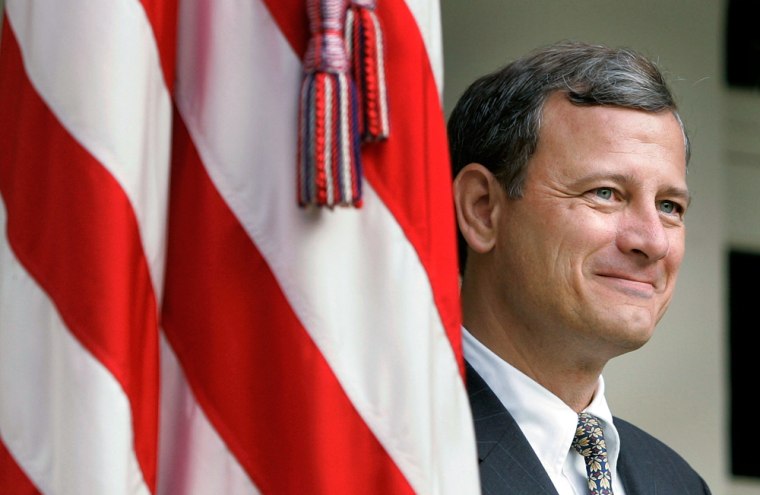WASHINGTON — George W. Bush keeps surprising the wise guys. They keep thinking that he’s going to be something other than what he is and that he will do something other than what he says he will do. Well, he and Karl Rove built his career on West Texas Bible Belt conservatism, with deep ancestral ties to the Establishment “up East.” And it was that president — half Cambridge, all “Come to Jesus” — who chose John G. Roberts Jr. for the U.S. Supreme Court.
In the words of the old Texas cliché, President Bush is the kind of leader, and person, who “dances with the one that brung him.” He is as loyal as a hunting dog. On a personal level, his inner circles stay inner and stay around him forever. It’s the same with politics. He owes “the base” — religious conservatives, corporate conservatives, Federalist Society libertarian conservatives — and he pays.
Doggedness vs. candor
This kind of personality is rare in politics, even rarer in the city of Washington. Bush likes to pull surprises, but only on matters of timing. George Bush hides in plain sight, a tactic that works here, since everyone always assumes the game is all about misdirection. Bush said he wanted to choose justices in the Scalia-Thomas tradition. Why would anyone think that he wouldn’t follow through on that promise?
Doggedness is not necessarily the same thing as candor, by the way. Once Bush decided to go to Iraq — and that may well have been before he was elected — he was going to go there, come hell or high water. He isn’t always forthcoming, shall we say, about the facts and the law that support, or don’t support, the course he’s set. But he’s damn well going to “git ’er done,” to use the parlance of the Cable Guy.
As a matter of political strategy, Roberts was a brilliant pick. Bush chose the most conservative judge he could find who also had a very high probability of Senate confirmation. Let’s use a golf analogy. He didn’t aim for the pin, but he laid it up just short for an easy putt.
I think of Roberts as Luttig Lite. A lot of attention focused in recent months on Judge Michael Luttig of the 4th Circuit, who has a similar conservative pedigree and is also known for his jurisprudential brilliance. But Luttig has been on the federal bench for many years and, as a result, has an enormous record of written opinions for liberal foes to dissect. Not Roberts. He’s been on the bench for less than two years and may well have wanted to steer clear of incendiary social issues while he bided his time.
The Roe v. Wade brief
His abortion record is a perfect mix of reassurance to the right and vagueness for the left. As deputy solicitor general under Bush One in 1991, Roberts signed the now-famous brief advocating the overturning of Roe v. Wade.
But his supporters, and even some Democrats, such as David Boies, make the mitigating argument that Roberts was only acting as an advocate for his client — which in this case was a Bush team desperate to improve its anti-abortion credentials heading into the 1992 campaign.
At his confirmation hearings for the Court of Appeals, Roberts said he held no personal views that would “prevent” him from upholding Roe if he had to. What a brilliant locution! He didn’t say that he WOULD uphold Roe in all circumstances — only that he wouldn’t necessarily overturn it. At least one friend and former close associate I spoke to thinks that, given the chance, Roberts WOULD vote to strike down Roe. But you can’t prove it — and interlocutors in the Judiciary Committee won’t be able to prove it either.
Impeccable credentials, and a nice guy
Besides, politically, abortion alone would not be nearly enough to derail the guy. His credentials are simply too good. He’s too well-liked around town, too well-regarded by expert practitioners in Supreme Court jurisprudence. Boies and Walter Dellinger, two of the best (Democratic) Supreme Court advocates around, sing Roberts’ praises.
They have faith that he will listen to reason when presented with well-crafted arguments on the high court. They think he is the opposite of a hack. It’s not just the Harvard/Harvard credentials, but the skill he has shown in the 39 cases he presented to the court over his years as a lawyer with Hogan and Hartson here in Washington.
He’s well-liked personally — and that matters here. He and his wife are members of a suburban Catholic parish known for its good educational programs and rock-steady values. His two kids are adopted. Washington sits on a substratum of Catholic conservatism that few people who aren’t from here understand. It goes back to Georgetown University and pre-D.C. Maryland history. It is that community that Roberts represents, and that Bush is paying homage to with this pick.
